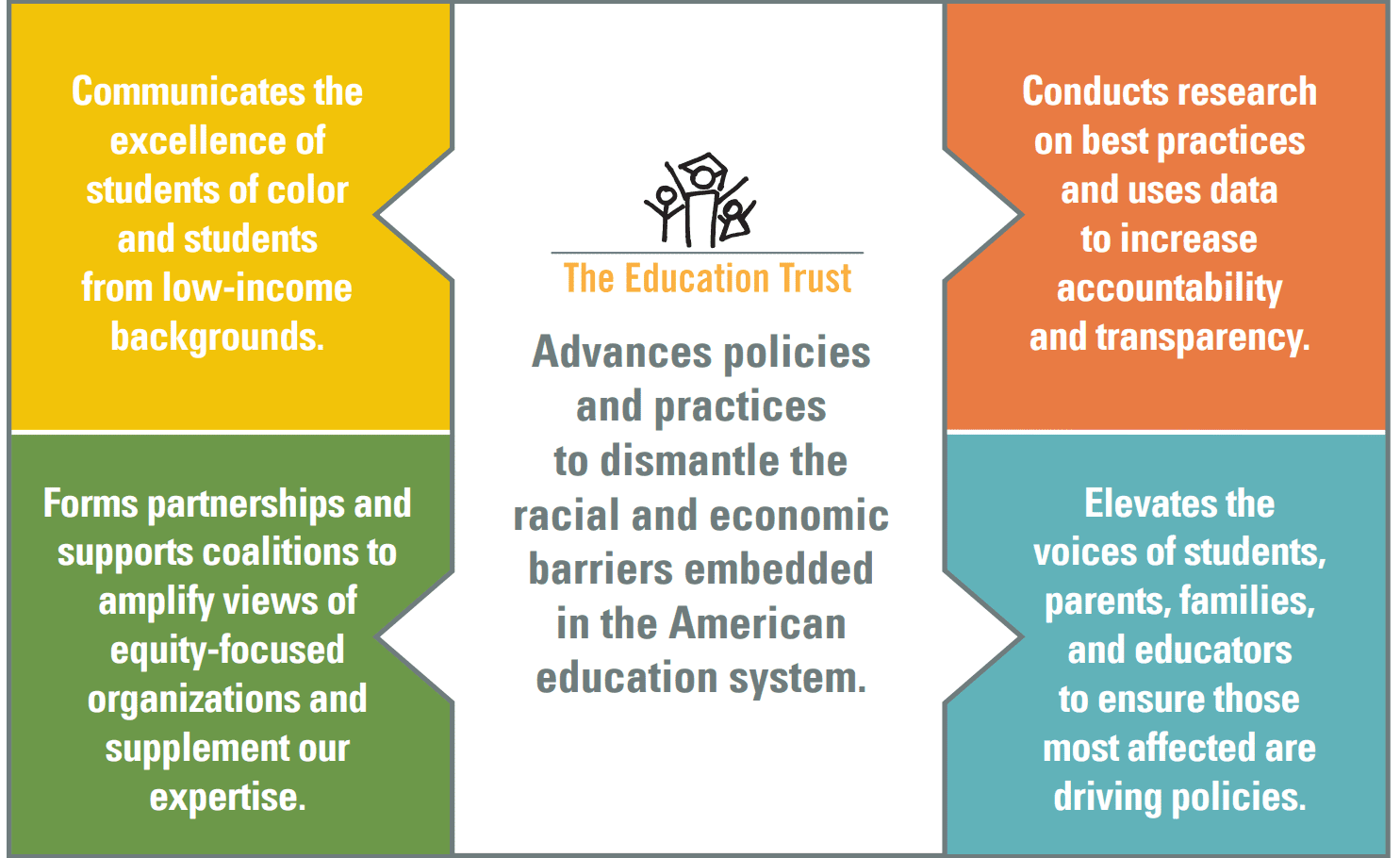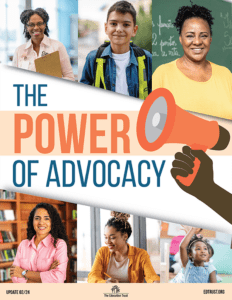All students — regardless of their skin color, families’ income, language spoken at home, or how they identify — should have access to high-quality learning opportunities that allow them to achieve educational excellence. This is education equity.
Through our research, policy analysis, and advocacy, Ed Trust support efforts that:
- Promote rich, engaging high-quality learning opportunities
- Increase college access and completion
- Engage diverse communities to advocate for education equity
- Increase political and public will to act on equity issues
Our approach to this work is informed by our theory of change, which includes four main components that aim to advance positive outcomes that improve the lives of those who are underserved, including Black students, Latino students, and students from low-income backgrounds.
In these quarterly reports, we showcase the work that Ed Trust, along with our partners, is doing.
Theory of Change

The Power of Advocacy
February 2024
The Power of Advocacy
For students, parents, and teachers, the quest for a high-quality education continues to be an amalgamation of hope and frustration — progress made, progress thwarted, and even progress rolled back by those who insist on maintaining the status quo.
Lately, extreme right-wing actors have launched a well-funded misinformation and disinformation media campaign to justify undermining our public schools and marginalizing students of color, LGBTQ+ people, and those most impacted by systemic inequities. If left unchecked, these fears and lies will destroy racial and gender identity freedoms, funding equity, academic standards, and mental health supports that are proven to advance students who’ve long been underserved.
However, the power of advocacy is allowing more voices to be heard to spotlight inequities and push back against dangerous, racist, and homophobic rhetoric. And EdTrust continues to speak up for our nation’s most underserved students, who are demanding their right to the pursuit of happiness — because this is the bedrock of our democracy.
This EdTrust update highlights our continuing mission to advocate for evidence-based strategies that improve student outcomes. In it, we feature many of our reports, media interviews, and training sessions, which call for essential changes that would enable every student to learn at high levels in safe, nurturing, and inclusive learning environments.
Highlights of Our Latest Work
Reports and Briefs
Digital Report: Creating Positive College Campus Racial Climates for Students of Color
Brief: Opportunities Denied: High-Achieving Black and Latino Students Lack Access to Advanced Math
Brief: Increasing Access to Advanced Coursework in Kentucky
In the Media
EdTrust’s work was featured in numerous media outlets including Texas Tribune, AFRO News, The 74, EdWeek, USA Today, Forbes, NPR, Washington Post, ABC News and Black Enterprise.
For more media coverage, see our In the News section.
On the Blog
Recent blog posts featured on our website include:
- The Literacy Crisis in the U.S. is Deeply Concerning—and Totally Preventable
- The New Gainful Employment Rule Set to Protect Black Borrowers From Predatory Colleges
- Why Education Equity is So Important, Right Now
- How FAFSA Delays Will Impact College-Going Decisions of Low-Income Students and Students of Color
- How Education Creates a Pathway for Formerly Incarcerated People’s Reintegration
- Could the Emerging Use of A.I. in Schools be the Next Digital Divide?
Social Media
EdTrust president & CEO Denise Forte was a guest on the PTA’s “Notes from the Backpack” podcast, where she encouraged parents and teachers to push back on recent censorship efforts.
Our Can’t Be Erased social media campaign won an Anthem Award in the Community Voices category. The campaign highlights the importance of protecting access to books by Black, Latino, Native, and LGBTQ+ authors, and to protest censorship of classroom discussions about the history of racism in the U.S.
Events
In October, advocates from different states gathered for “ESSER Funding Sustainability Workshop: Preparing for the Fiscal Cliff,” which featured guest speakers from Education Resource Strategies (ERS), the Council of Chief State School Officers (CCSSO) and the American Institutes for Research (AIR).
In January, EdTrust, TeachPlus, the National Urban League, All4Ed, the National Center for Learning Disabilities, and UnidosUS co-hosted “The Equity Beyond ESSER” workshop for district leaders and other school community stakeholders to learn practical strategies to advocate for fair funding in their school communities.
State Offices
EdTrust-West
On November 2023, EdTrust-West released “More to Be Done: California’s Local Control Funding Formula After a Decade,” a report analyzing some of the successes and failures of the Local Control Funding Formula (LCFF) in the 10 years since its adoption.
In partnership with workforce advocacy organization California Competes, EdTrust-West launched The California Alliance for Student Parent Success, a network of parenting students, education leaders, and advocates committed to developing and implementing solutions to address the barriers impacting student parents’ postsecondary success.
In January, Gov. Gavin Newsom announced that he appointed Dr. Christopher Nellum, executive director of EdTrust-West, to the California Cradle-to-Career Data System Governing Board.
EdTrust-Midwest
In February, EdTrust-Midwest issued its new “Impact Report” celebrating policy wins over the past three years — including a success rate of 76% when it comes to advancing the organization’s legislative priorities — and advocacy on behalf of students who are underserved.
Following sustained advocacy efforts by EdTrust-Midwest and its partners, Michigan Gov. Gretchen Whitmer’s Growing Michigan Together Council included several key transformational education recommendations in its final report, released in December, including a recommendation to fully fund the state’s new Opportunity Index — a school funding mechanism that will drive greater state investment in students from low-income backgrounds.
EdTrust-New York
The Raising New York coalition, convened by EdTrust-NY, sent a letter to Gov. Kathy Hochul detailing the coalition’s 2024 policy priorities. More than 30 organizations signed on to the letter urging New York State to prioritize policies that expand access to high-quality and affordable childcare for all families.
EdTrust-New York published a report in January 2024 which highlights how the New York State Education Department (NYSED), local school districts, institutions of higher education, schools, and advocates are working toward improving educator diversity.
The New York Campaign for Early Literacy, convened by EdTrust-New York, launched in January. The campaign is a statewide movement designed to harness the collective voices of individuals and civil rights, education, parent, nonprofit, and business organizations to improve student reading outcomes.
EdTrust-Tennessee
EdTrust-Tennessee championed legislation in 2022 that led to a comprehensive overhaul of the state’s K-12 funding formula. This revamp is a key step toward ensuring that every child has the educational resources and access to high-quality teaching they need to succeed.
Applying lessons learned from advocating for equitable funding reform in Tennessee, the EdTrust-Tennessee team has launched a regional strategy to improve school funding across the South.
EdTrust-Tennessee published a new report last fall, “A New Promise: Ensuring Equitable Financial Aid Design for College Students in Tennessee,” the report, which makes policy recommendations for how to improve financial aid systems to ensure that more students from low-income backgrounds are making it to and through college in Tennessee.
EdTrust-Tennessee convened The Tennessee Alliance for Equity in Education, a coalition of more than 85 partner organizations across the state who share a unifying belief that our schools and postsecondary institutions can create pathways to a more just Tennessee.
In the States
Texas
EdTrust in Texas was instrumental in informing a state commission created to make recommendations on community college finance. In a state where 70% of first- and second year college students go to a public two-year institution, EdTrust helped form a student advisory council to advocate for policy solutions.
EdTrust in Texas is also hard at work advancing P-12 and higher education recommendations to elevate the biggest challenges and opportunities for lawmakers to tackle in the next legislative session.
Louisiana
EdTrust, partnering with the Baton Rouge Alliance for Students, created the Baton Rouge Youth Voice Initiative, which engages students in conversations about improving their education system.
EdTrust in Louisiana hosted workshops on our student voice work at the New Orleans College & Career Attainment Network’s (NOLACCAN) Life After High School conference and at the STRIVE Together Literacy Convening, where we also presented on our early literacy campaign.
Delaware
EdTrust led strategy sessions with Rodel, Bellwether, and the ACLU of Delaware to discuss ways to engage advocates around funding reform recommendations based on the American Institutes for Research (AIR) school funding recommendations report.
Kentucky
EdTrust supported the Prichard Committee for Academic Excellence in developing resources that advocate for increased access to advanced coursework for Black, Latino, and students from low-income backgrounds in Kentucky. Prichard highlighted the benefits of these policies in a recent op-ed.
Maryland
The Maryland Alliance for Racial Equity in Education (MAREE) coalition has increasingly engaged with the Maryland Legislative Black Caucus, the country’s largest group of Black elected officials at the state level. EdTrust also continued to provide strategic thought partnership and technical assistance to the Black and Brown Coalition for Educational Equity and Excellence in Montgomery County.
Massachusetts
In October, in partnership with the Massachusetts Business Alliance for Education (MBAE) and Latinos for Education, we released the report, “Lifting Our Communities: Building Education Pathways to Economic Opportunity for All.”
On the Hill
EdTrust successfully helped shape the reintroduction of the Advanced Coursework Equity Act.
In December, EdTrust convened a meeting with partners and the U.S. Department of Education to discuss how stakeholders and ED can work together to support academic recovery and accelerated learning in the final nine months of ESSER fund availability.
On January 30, Denise Forte testified in front of the United States House Committee on Oversight and Accountability’s Health Care and Financial Services Subcommittee for a hearing called “America’s Report Card: Oversight of K-12 Public Education.”
November, EdTrust drafted a letter signed by more than 50 national and state partners to members of Congress expressing our strong opposition to the House Republican proposal, which would decimate America’s education system. Our efforts contributed to the defeat of the proposal.

